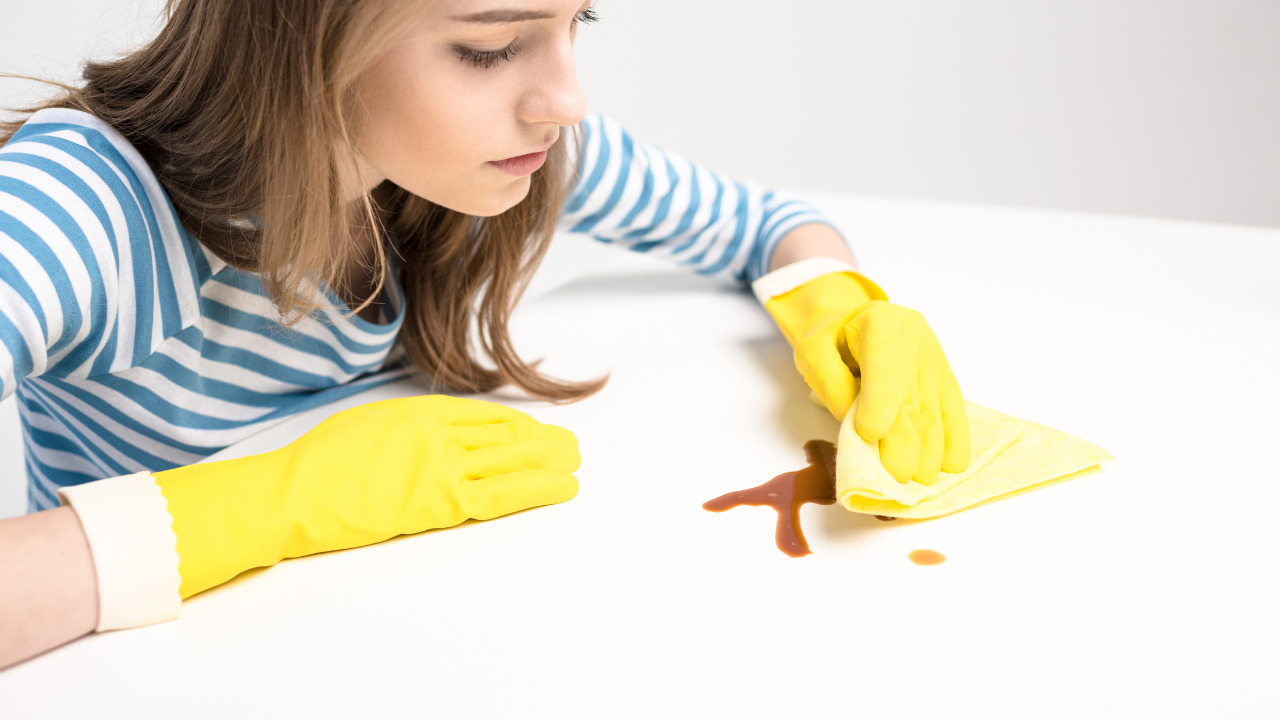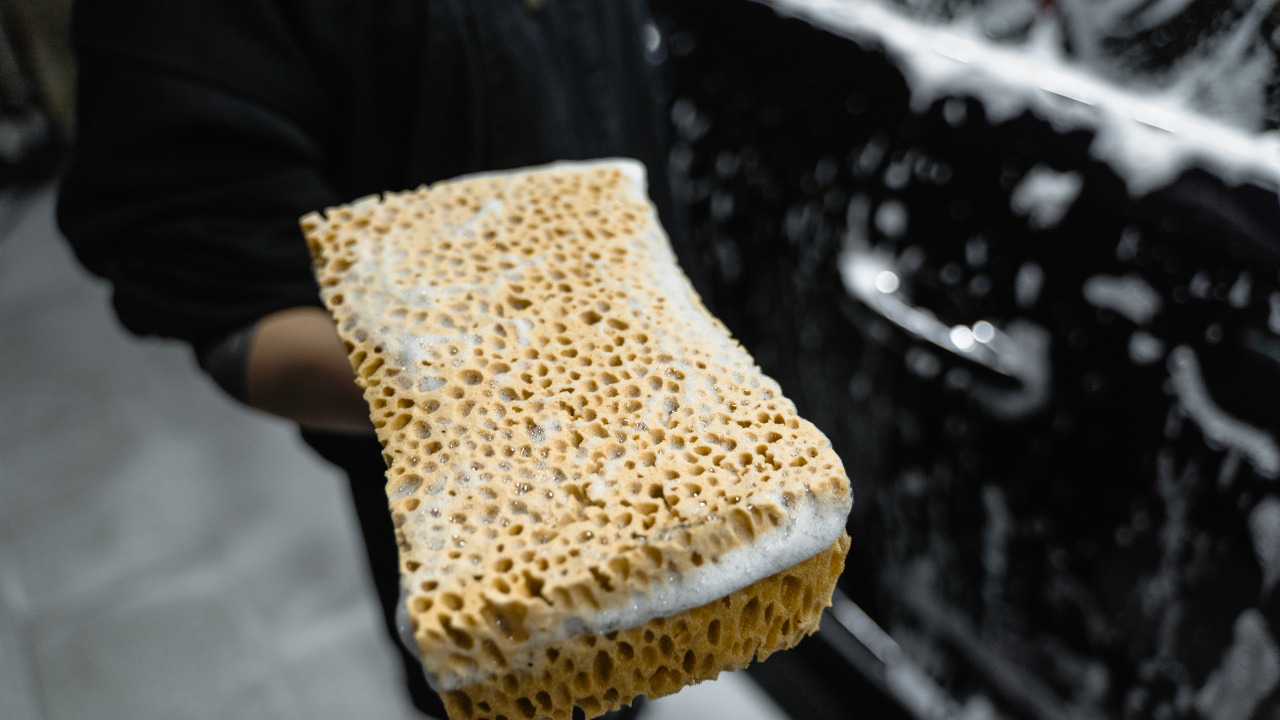Vinegar is a common ingredient in most kitchens, and it’s commonly used to prepare pickles or make a tasty vinaigrette salad dressing. You’re missing out on hundreds of household uses if you only use vinegar in the kitchen.
Most significantly, vinegar is inexpensive, eco-friendly, and effective at removing stubborn paint without hazardous chemicals or poisonous fumes. Don’t worry if the smell of vinegar bothers you. The vinegary odor dissipates quickly.
However, because concrete rapidly absorbs paint, removing dried paint from concrete may be time-consuming and frustrating. While removing dried paint takes time, it isn’t impossible. Step-by-step instructions in this post will help you for removing paint from concrete.
Table of Contents
How Does White Vinegar Remove Paint Stains?
Vinegar is readily available. You can find it in your refrigerator or purchase it at your local supermarket. It’s one of those home staples. Vinegar can also assist you in resolving technical issues at home. Vinegar is mostly used as a cost-effective household cleanser.
Because vinegar is acidic, it aids in the removal of dried paint from concrete. It works well with water-based paints as opposed to oil-based paints. You can remove paint without hazardous or synthetic chemicals in your home with patience and effort. Now it’s time to fetch your vinegar, scrub it off, and work.
Needed Equipment And Materials
- Water
- Mild soap
- Soft bristle brush
- Warm vinegar
- Scrapping tool
Steps To Remove Dried Paint Stains From Concrete With White Vinegar
Deep Clean The Concrete Surface Firstly
To make cleaning easier, remove any dirt or debris from the area with a broom or vacuum cleaner. Scrub the surface with a wide-wire brush after preparing a solution of warm water, soap or warm water, and trisodium phosphate.
Allow for a two- to three-hour drying period for your solution. Because trisodium phosphate is hazardous, use caution and wear protective equipment when handling it. Phosphate detergents have been outlawed in some states due to their environmental impact.
Warm Up The White Vinegar
In a small saucepan, warm a few drops of white distilled vinegar. Alternatively, you can microwave the vinegar in a microwave-safe bowl.
Use A Sponge
In the hot vinegar, dip a clean paintbrush or sponge. Apply the vinegar to the dried paint and let it sit for a few minutes. You can also use a soft bristle brush to remove stains after dipping them in the white vinegar.
Let The Vinegar Sit On The Concrete
Once you have put the sponge on the stained concrete, let it sit there for at least for 20-minutes before brushing or scrubbing. It will help soften the stains, and you can remove them effortlessly.
Use A Paint Scrapper
Once the paint has loosened, use a paint scraper to remove the scraped paint. Wipe the surface with warm water to remove debris and paint leftovers.
Why Should You Prefer White Vinegar To Remove Paint Stains?
While you now understand how the components of vinegar aid in the removal of paint, it must persuade you that it works. If you still need persuasion, consider the following advantages of utilizing vinegar to solve your domestic issues.
A Non-Toxic Substance
Vinegar is your best friend regarding stains, corrosion, and mold. The natural acidity of vinegar contains antifungal and antibacterial qualities that aid in cleaning surfaces prone to hazardous chemicals.
The effectiveness of vinegar as an early cure has been proven and studied by many professionals and scientists. Vinegar is a type of alcohol that has been fermented. Because it simply employs chemicals already available in nature, there is no need to jeopardize the world’s health.
It has no negative influence on the environment because of its all-natural components. Vinegar does not pollute the environment in which it is discarded, even after being disposed of.
A Versatile And Sustainable Option
Vinegar is your best friend regarding stains, corrosion, and mold. The natural acidity of vinegar contains antifungal and antibacterial qualities that aid in cleaning surfaces prone to hazardous chemicals.
The effectiveness of vinegar as an early cure has been proven and studied by many professionals and scientists. Vinegar is a type of alcohol that has been fermented. Because it simply employs chemicals already available in nature, there is no need to jeopardize the world’s health.
It has no negative influence on the environment because of its all-natural components. Vinegar does not pollute the environment in which it is discarded, even after being disposed of.
Other Alternative Methods To Clean Dried Paint From Concrete:
Soap And Hot Water Mixture
You can also use soap and hot water after the vinegar effort. We decided to try the soap because it works so well on many things. You can scrub the floor with a mixture of soap and hot water. Then scrape the stains away.
Pressure Washing
Pressure washing is good, but only if the stains are new. If you want to try it for dried paint stains on concrete, you can surely go for it. However, the results wouldn’t be satisfactory or according to your needs after pressure washing.
Choose this process only if there are only a few dried paint stains on your concrete. Otherwise, go for the alternative methods.
Use Paint Thinner
Even while you might not get rid of every last piece of paint, you can do a few things to ease cleanup. Paint thinner is one of the best chemicals for removing paint from concrete. Scrub the spill with a sharp brush after using paint thinner.
Before the paint is removed, you might need to apply numerous treatments. Paint thinner, on the other hand, works wonders in getting rid of even the most difficult paint spots. So, reach for the paint thinner the next time you spill paint if you’re seeking a quick fix.
Frequently Asked Questions
Does Dried Paint Removal Require More Time?
When an oil-based sealer has dried and hardened, it can be challenging to remove, especially the moisture-resistant varieties. You can get around this issue by removing such sealants using undiluted vinegar. Undiluted vinegar will liquefy the dry covering, making it simpler to remove with putty or a scraper.
It should, however, be handled carefully as it can be quite caustic. It takes vinegar longer to soak in and disintegrate a surface with more coatings. Cure coatings require more time to remove, whereas fresh or wet paint can be removed in just one minute.
Can You Use Water To Remove Paint From Concrete?
Water cannot remove paint from concrete. That’s why you must use a mixture of water and vinegar or only organic vinegar to remove paint from concrete.
Do I Need To Use Chemicals To Remove Paint From Concrete?
No worries if you are not a great fan of chemicals or toxic cleaning solutions; You can use natural or organic DIY methods to remove paint from concrete. A few natural ways to remove paint from concrete are baking soda, vinegar, lime juice and hydrogen peroxide.
Conclusion
It can be a hard task to remove old paint from concrete. However, if you follow the steps above and use the proper tools to make your concrete surface look new. You may remove paint from your wall without needing hardware equipment by heating your vinegar solution.
It saves time and money while assisting you in a more environmentally friendly lifestyle. It also saves much time because it only takes a few minutes to complete. As a result, always keep a bottle of vinegar on hand; you never know when it will come in helpful.













